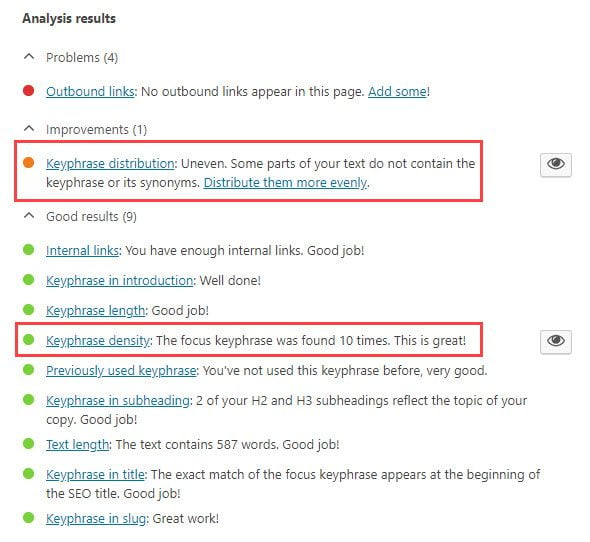The internet is a completely different space than it was 20 years ago. If you remember the days of GeoCities and Angelfire, then you probably have seen first-hand how terrible keyword stuffing is and why it’s to be avoided. Similarly, anyone who spent time online between 2008 and 2013(ish) saw the rise and fall of keyword stuffing as an effective way to get flimsy content ranking high in searches, yet providing no real benefit to the user. So what is keyword stuffing? Let’s dig in so we don’t repeat the sins of the past.
Subscribe To Our Youtube Channel
What Exactly is Keyword Stuffing?
When it comes right down to it, keyword stuffing is awkwardly inserting whatever term you’re trying to rank for all over the article. Whether it fits there or not.
Back in the old days of the internet, before search algorithms were as smart as they are today, people could game the system by inserting irrelevant keywords into their posts and rank for topics that were only (if users were lucky) tangentially related to the main topic. Because at the time, Google and other search engines weren’t sophisticated enough to realize that just because a site said we sell the best pool noodles 40x, they might actually be just a parked advertising page that did not, in fact, sell the best pool noodles.
Since then, Google and other search engines have become much more intelligent, taking semantic SEO and search intent into consideration on sites. You still want to target keywords (otherwise how in the world will users or the robots find your site?), but you want to do it smartly. Not wantonly.
Why Keyword Stuffing Is Bad
On the technical side of things, keyword stuffing is bad because Google will penalize your site for it and not rank your site in search results. In terms of worst-case scenario, being blacklisted from Google and not ranking is kind of a big deal.
On the other side of that, user experience is a major factor in not keyword stuffing anymore. Readability and search intent are extremely important these days because you’re competing with so many other platforms for your readers’ attention. You want to be concise, succinct, and not waste their time.
Keyword stuffing wastes their time. They have come to your site with a specific query, looking for specific information. Keyword stuffing obfuscates that information, if it’s even there at all. You will hide it behind a wall of pointless and redundant wording. Sometimes, when you’re piling the terms into a paragraph, the words just stop making sense. And if your visitors can’t find what they need with just a scan and a couple scrolls, they will leave and click the next result in search.
Sure, you got their click and single ad impression, but your bounce rate will be insanely high and that person will not be a customer…probably at any point.
How You Can Avoid It
Outside of following the normal best practices for optimizing your site’s SEO, you can follow a couple simple guidelines to keep your works free of stuffing and as clear and rankable as possible.
Create Good Content
The best way that you can avoid this SEO blunder is to write content that people want to read. That’s kind of the number one rule of internet content creation. More than that, create content that answers people’s questions. If you’re doing a roundup of the best pool noodles, you will obviously be using that term organically. Sentences like “The SuperNoodleXL is one of the best pool noodles available, only beaten out by the NoodleXtreme” include the search term and read like something an actual person would say.
If you create content that someone would want to read, keyword stuffing won’t even be an issue. Think about the search terms you use, and then look at the sites that are the most helpful. Usually, those are organically written posts that answer your question. Maybe they will explain some details or provide resources, too. Not just provide a paragraph or two that read like a thesaurus.
Don’t Write Like It’s 2008
That’s honestly harder than you’d expect sometimes. Luckily, most of the top WordPress SEO Plugins can make things easier for you. In the Yoast SEO tab, for example, you can see lots of metrics on your keyphrase on a green-orange-red scale of good to bad.

While each and every one of these elements should be taken into consideration for your article’s SEO, the ones regarding keyword stuffing specifically are keyphrase density and keyphrase distribution.
Keyphrase density is simply the number of times in your article that you use your term. Yoast will tell you if you’re going overboard. Keep in mind that Yoast is tracking this dynamically through the length of your post. So a 400-word article will get yelled at for having too many keyword uses that would be just fine in a 1200-word post. As you can see in the example, a 600-word post comes in as green at 10 instances of the keyword, roughly every few sentences. Not each and every one.
In terms of keyphrase distribution, Yoast is telling you about keeping them spread out enough that it doesn’t become frustrating to read. Or that you’re not stuffing one part of the post about this topic and another part about that. Readers are looking for information, while search engines are looking for keywords. Semantically, though, you want to write for humans, which means spreading your particular keyphrase throughout your entire post. Which again goes back into writing content that people will want to read.
Wrapping Up
Keyword stuffing, despite being pretty easy to avoid, still plagues lots of websites. It holds them back, not only in search results, but building an audience, too. Use plugins like Yoast and consider your work being read by actual people. Just those two things can and will change how the internet sees your content, both in terms of actual users and the robots that Google and other search engines send your way.
What are your strategies for SEO to avoid keyword stuffing?
Article featured image by Aleutie / shutterstock.com









I got my first job in marketing recently and one of the first things they drilled into me was the fact keyword stuffing was bad. I did a brief stint as a journalist a few years ago and at the company I worked for it was all the rage. SEO’s changed a lot in recent years, that’s for sure.
Good article, but one simple bit advice I always give clients is to right an article as a human for your human vistors rathor than trying to fool google bots, by doing that you have a better chance of creating relevent content.
Can we please have RankMath integration?